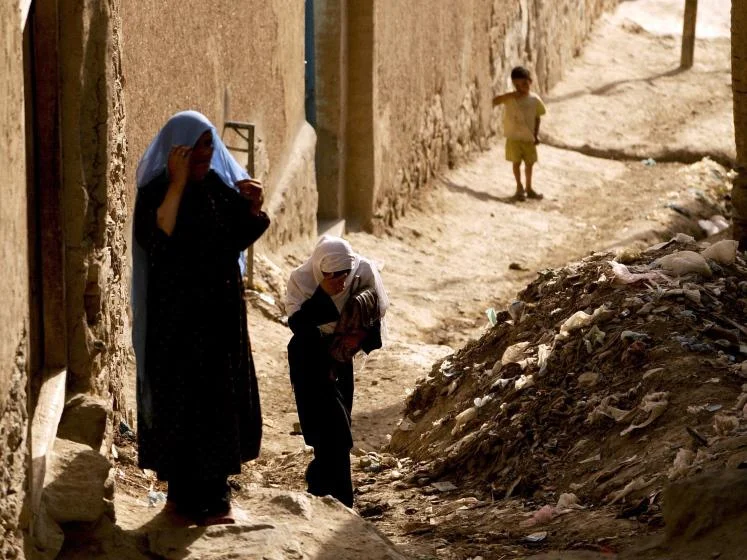Increases in extreme poverty neglected in the Covid policy debate

The poverty consequences of the pandemic should be given as much importance by policy-makers as its mortality consequences, according to new research from the London School of Economics and Political Science, the University of Oxford and the World Bank.
Researchers examined the impact of Covid on wellbeing around the world by using human life-years as a unit of measurement to quantify both increased mortality and higher poverty. They estimated that almost 20 million life-years were lost to COVID-19 by December 2020. Over the same period and by the most conservative definition, over 120 million additional years were spent in poverty because of the pandemic. For richer countries, the mortality burden is higher due to larger elderly populations and higher life expectancies. For most poor and middle-income countries, greater economic deprivation has been a more important source of loss in wellbeing.
Their article, Death and Destitution: the global distribution of welfare losses from the COVID-19 pandemic, notes that by December 2020, 1.64 million people had died and global GDP per capita had declined by 5.3 per cent. Economic contraction was widespread, with 172 countries out of the 182 for which data is available experiencing negative growth.
It adds: "This severe global economic shock has caused the first reversal in the declining trend in global extreme poverty (measured as the share of the world’s population living under $1.90 per day) since the Asian Financial Crisis of 1997 – and only the second real increase in world poverty since measurement began in the early 1980s. This increase in extreme deprivation comes with its own suffering and anguish: jobs and homes were lost and people struggled to feed their children and themselves. Many asked whether they ‘would die of Coronavirus or hunger?’"
Using the international extreme poverty line of $1.90 per day, researchers found that the world’s poorest countries experienced poverty burdens between one hundred and one thousand times greater than the richest. However, when poverty lines typical of each of the four income categories (low income, lower middle-income, upper middle-income and high income) are used instead, that relationship effectively disappears – suggesting that less extreme poverty also rose markedly in many rich countries.
The paper concludes: "The economic consequences of the pandemic in terms of increased poverty cannot be treated as being of secondary importance. Even at our most conservative rate for comparing life- and poverty-years (20 of the latter to one of the former), there are 70 countries in our sample where poverty was a more important source of declining well-being than mortality. That number rises to 108 countries (three quarters of our sample) at the lower rate of five poverty-years to one life-year. Most (but not all) of those countries tend to be poor. Thy are not the countries where the medical and social scientists, journalists and global civil servants that set the terms of the ‘global’ public debate are located. The importance of the poverty consequences of the pandemic, relative to those of mortality, has not been given its proper weight in the global discussion."
The paper notes that ‘demography is not destiny’, saying that Japan, the world’s ‘oldest’ country suffered welfare losses lower than Belgium, Germany and the US. China, South Korea, Norway and Australia did even better. This reflects differences in policy responses to containing the virus, it suggests.
The paper reflects on likely outcomes for 2021, with poorer countries expected to do even worse due to the unequal access to vaccines.
It concludes: "Our analysis does suggest that the poverty consequences of the pandemic should be given as much importance in the global policy conversation as its (horrendous) mortality consequences. For most poor and middle-income countries, greater economic deprivation has in fact been a more important source of loss in wellbeing than premature mortality. Ignoring the large welfare costs of destitution would lead us to wrong conclusions about the distribution of the burden of the pandemic across countries, exaggerating the share of suffering visited on richer, older countries, to the detriment of poorer ones."
Francisco Ferreira, one of the authors, commented: "Despite the older populations and higher mortality burdens in upper-middle and high-income countries, when the welfare costs of economic deprivation are taken into account poorer countries may have been just as hard hit in 2020. Unfortunately, the highly unequal distribution of vaccine availability seems certain to further skew the distribution of the burden of the pandemic toward poor countries in 2021."
Professor Ferreira is the Amartya Sen Professor of Inequality Studies and Director of LSE’s International Inequalities Institute. He is also affiliated with LSE’s Department of Social Policy.
Death and Destitution: the global distribution of welfare losses from the COVID-19 pandemic by Francisco H. G. Ferreira (LSE), Olivier Sterck (University of Oxford), Daniel Mahler and Benoît Decerf (World Bank) is published in the latest edition of LSE Public Policy Review.